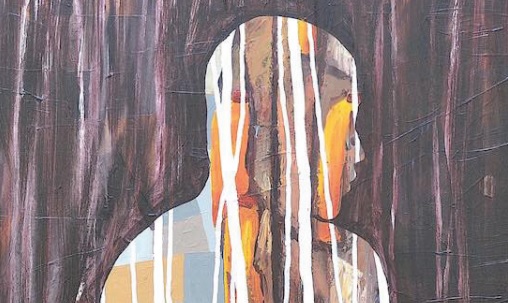
Sekajugo’s artist inspired by prejudices around identity
Kampala, Uganda | DOMINIC MUWANGUZI | Each of us is unique. It is impossible to judge us outside of our individuality or using one yardstick. Still, stereotypes persist. And these issues are the inspiration for Collin Sekajugo’s recent exhibit `What is beautiful’. He interrogates themes of personal identity.
Sekajugo is of multi-ethnic background. His mother is from Rwanda and father from Masaka in South –western district of Uganda. He grew up in Kenya and has lived in Uganda and Rwanda. Defining his individuality has been a preoccupation for him since attempts by society to define him by his physical looks often fail. He prefers to be defined by his inner person when confronted with the question of who he is.
In his art, Sekajugo seeks to dismiss prejudices by deploying his body on canvas as a central subject and a symbol of a vessel that inhabits the good qualities sometimes the public misses when they set out to judge someone. What lies beneath our bodies is often beautiful but it cannot be revealed easily, he suggests. Misjudgment often leads to stereotyping based on, for example, particular tribes. The Banyakore are this (mention stereotype), the Bakiga that, and the Basoga and Baganda that. These stereotypes are attached to identities of people without ascertaining their inner values, character and relations with the community they live in.
Technically, Sekajugo’s approach is unconventional, possibly because he is a self –taught artist, without the rules of formal art training. He creates outside the box, is innovative and experimental. He integrates non-traditional material; especially collages of synthetic media, in his collage painting. He uses found objects – Kitengi, Kikoyi and denim fabrics.
The synthetic materials create a familiarity in his art to the audience since most are used in everyday fashion; on shirts, dresses and interior décor.
Sekajugo is founder of Ivuka Arts Centre, Kigali, Rwanda that became internationally recognised for its initiative to rebuild the Rwandan society that had become fragmented because of the 1994 genocide. He defines himself as an “artist with a social conscience.”
Ivuka means re-birth in Kinyarwanda and Ivuka Arts Centre gives youth an opportunity to re-discover themselves and heal through the arts.
Additionally, the community artist, established Weaver Bird ( Ndegeya) Arts Foundation, in Masaka, as a platform to develop the local community through the arts.
So he is quit experienced in relating with the local community and is always keen to promote such ideology in his art. This is evident in his series of `Boda-boda helmets 2015’ that emphasizes the theme of road safety and `If Wishes Were Horses 2014’ exhibit that touched on the theme of African migrants to Europe.
What is beautiful, Sekajugo’s recent solo exhibition is showing at Afriart on 7th, located on 7th Street industrial Area, within the Studios Building.
 The Independent Uganda: You get the Truth we Pay the Price
The Independent Uganda: You get the Truth we Pay the Price



